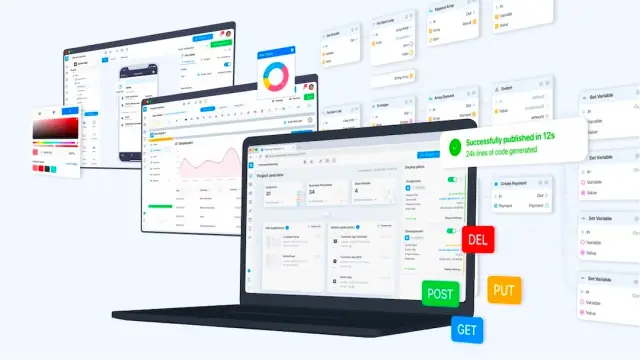Overcoming Business Challenges with Low-Code Development
Discover how low-code development platforms can help your business overcome challenges, drive innovation, and accelerate growth in today's fast-paced digital economy.

The Rise of Low-Code Development
Today businesses always look for new ways to provide great customer service and drive innovation. Many companies choose low-code development for creating powerful software applications quickly, without the need for hand-coding. Low-code and no-code development platforms, such as AppMaster, provide visual drag-and-drop builders and pre-built components that simplify application development for developers and non-technical users alike.
By reducing manual coding and accelerating the development process, low-code platforms enable businesses to keep up with the dynamic digital environment and stay ahead of their competitors. As a result, low-code development has become increasingly popular across various industries. The market for low-code development platforms is rapidly growing, as organizations discover the benefits of faster application delivery, improved agility, and cost-efficiency.
Addressing Major Business Challenges
In today's fast-paced business environment, companies face a myriad of challenges that can hinder their growth and success. Low-code development platforms can help businesses overcome these challenges by offering a streamlined, agile approach to creating and implementing software applications. Some of the key challenges that low-code development can address include:
- Slow application development and time-to-market
- High development and maintenance costs
- Limited IT resources and skills
- Complex data integration and management
- Poor customer experience
By providing a modern, efficient solution to these challenges, low-code platforms enable businesses to adapt and thrive in the digital era.
Enhancing Agility and Flexibility
One of the key advantages of low-code development is its ability to enhance a company's agility and flexibility. The rapid pace of innovation in the digital world demands organizations to be adaptable and responsive to change. Low-code platforms enable businesses to:
- Shorten development cycles: With visual builders and pre-built components, low-code platforms significantly reduce development time, allowing businesses to deliver applications faster and with fewer resources.
- Streamline application updates and modifications: With low-code development, making changes to applications is easy and quick, minimizing development downtime and ensuring businesses can pivot and adapt to changing needs.
- Empower citizen developers: By enabling non-technical users to create and maintain applications, low-code platforms widen the pool of available talent within an organization, relieving IT teams of the burden of managing every aspect of application development and implementation.
- Support scalability: Low-code platforms provide the flexibility to scale applications up or down to accommodate fluctuating demands, ensuring businesses can grow and evolve without being held back by their software infrastructure.
Embracing low-code/no-code development can help businesses improve their agility and flexibility, making them more prepared to navigate the constantly evolving digital industry. With platforms like AppMaster, companies can adapt to new trends and opportunities more easily, ensuring continued growth and success.
Unleashing Business Innovation
Today businesses need to innovate constantly to stay ahead of the curve. Low-code development is a game-changer for businesses seeking innovative solutions as it empowers teams to experiment, iterate, and launch new products or services more efficiently.
Firstly, low-code platforms democratize the innovation process. Not only experienced developers but also non-technical experts, such as product managers, marketers, or business analysts, can contribute creative ideas, design, and improve applications to meet specific business requirements. This collaboration across different teams leads to a greater diversity of ideas, an essential ingredient for innovation.

Secondly, low-code and no-code platforms like AppMaster.io enable rapid prototyping. Businesses can quickly develop and test applications to validate their viability, gather user feedback, and iterate. This agility allows companies to stay in tune with market trends, respond to customer needs faster, and stay ahead of the competition.
Lastly, low-code development supports integration with other software tools and services. Businesses can leverage APIs and pre-built connectors to integrate with third-party systems, unlocking innovative possibilities, and extending the functionality of their applications. Integrations enable organizations to automate processes, enhance workflows, and access valuable data, enabling informed decision-making and driving innovation.
Saving Time and Reducing Costs
Low-code platforms are invaluable when it comes to saving time and reducing costs, making application development more accessible and affordable:
Speed of Development
Low-code platforms like AppMaster.io enable businesses to create applications within days or weeks, instead of months or years. Visual editors and pre-built components streamline the development process, shortening time to market.
Reduced Need for Technical Skills
The intuitive, drag-and-drop features allow users with minimal technical knowledge to create applications. By reducing the dependency on skilled developers, companies can reduce costs associated with hiring and retaining talent.
Resource Optimization
With faster development cycles and increased user involvement, businesses can optimize the use of their resources. IT teams can focus on high-value tasks, while business users can directly participate in application development, increasing overall productivity.
Reduced Technical Debt
Low-code platforms maintain code quality and prevent applications from becoming obsolete. Every time an application is modified or updated, the platform regenerates the code, ensuring that it remains clean and free of technical debt.
Maintenance Cost Savings
Low-code platforms simplify application maintenance by offering visual versioning and one-click update features. This allows businesses to reduce the time and cost spent on maintaining the software, ensuring applications stay up-to-date and relevant.
Improving Customer Experience
Customer experience is a critical factor for business success in the digital age. Low-code development platforms enable companies to improve the customer experience in several ways:
- Rapid Application Development: Businesses can promptly address customer needs or market changes by developing new applications or updating existing ones quickly. For example, companies can create or modify apps to launch promotions, introduce new services, or offer additional customer support channels.
- Personalization: Low-code platforms provide advanced UI/UX design capabilities, enabling businesses to create personalized and user-friendly applications. Customizable templates, layouts, and styling options make it easy to tailor applications to specific customer segments, improving user engagement and satisfaction.
- Real-time Data and Insights: By integrating low-code applications with external data sources and analytics tools, companies can gather valuable customer insights. Real-time data enhances decision-making and helps businesses refine their strategies to better serve their customers.
- Responsive and Adaptive Applications: Low-code and no-code platforms like AppMaster.io enable businesses to create responsive and adaptive applications that work seamlessly across devices and platforms. This ensures customers have an excellent experience, regardless of whether they access the app on a smartphone, tablet, or desktop.
- Omni-channel Experience: Low-code development supports creating applications for various channels, including web, mobile, and backend. By offering a consistent experience across platforms, businesses can provide customers with the convenience and flexibility they demand.
By adopting low-code development, businesses can significantly improve the customer experience, resulting in increased satisfaction, loyalty, and, ultimately, revenue.
Optimizing Workflow and Data Management
Efficient workflow and data management are integral to a successful business operation. Low-code development platforms provide the tools necessary for businesses to optimize their workflows and manage data effectively, leading to increased efficiency and productivity.
One of the primary benefits of low-code development is the ability to integrate and automate various processes within the organization. Low-code platforms provide features such as visual workflow builders and data modeling, which allow for easy configuration of business processes. By automating tasks and streamlining operations, organizations can reduce manual work, minimize errors, and focus on high-value activities.
Data management is another crucial aspect that low-code platforms address. Businesses generate and handle vast amounts of data daily, which can be challenging to manage using traditional methods. Low-code platforms provide solutions for data integration, storing, processing, and visualization. By offering a seamless way to connect to multiple data sources, low-code platforms eliminate data silos, ensuring that businesses have access to accurate, real-time information.
Furthermore, low-code platforms incorporate security best practices and policies to protect sensitive data. Access control and data encryption features ensure that businesses can confidently manage sensitive information while meeting compliance requirements.
Scaling to the Enterprise Level
Low-code development platforms are not limited to small and medium-sized businesses; they can also scale to the enterprise level to address the unique challenges faced by large organizations.
Enterprises often need to manage complex systems, large user bases, and extensive data sets. Low-code platforms are designed to meet these requirements, offering powerful features tailored for enterprises, such as:
- Scalable architecture: Low-code platforms support a scalable architecture, allowing businesses to develop and deploy applications that can grow with their needs. Using auto-scaling and containerization technologies, low-code platforms ensure that applications can handle an increasing number of users and transactions without compromising performance.
- Integration capabilities: Enterprise-level businesses often use a wide variety of software systems and applications. Low-code platforms facilitate integration with existing systems, such as ERP, CRM, or marketing automation tools, enabling organizations to streamline processes, eliminate data silos, and improve overall operational efficiency.
- Security and compliance: Enterprises typically have stringent security and compliance requirements. Low-code platforms prioritize security, incorporating features like multi-factor authentication, role-based access control, and data encryption. These security measures ensure that applications are protected from potential threats and meet compliance standards.
- Customization and extensibility: Enterprise-level businesses often require custom features and capabilities beyond the standard offerings of low-code platforms. Advanced low-code platforms allow developers to extend the platform's functionality with custom code, ensuring that specific business needs are addressed.
These capabilities make low-code platforms a powerful tool for enterprise-level businesses looking to accelerate digital transformation and improve their operations.
Low-Code vs. Traditional Development
Low-code development platforms have emerged as a modern alternative to traditional software development. Understanding the key differences between low-code and traditional development can help businesses make informed decisions when choosing the right approach for their needs.
There are several notable differences between low-code and traditional development:
- Speed of development: Low-code development platforms significantly accelerate the application development process. With visual builders, pre-built components, and reusable templates, developers and non-technical users can quickly create and deploy applications, reducing time-to-market and allowing businesses to adapt rapidly to market changes.
- Reduced reliance on developers: One of the biggest constraints in traditional development is the limited availability of developers. Low-code platforms minimize the reliance on skilled developers by enabling non-developers to contribute to application development, allowing businesses to overcome resource constraints and scale app development efforts.
- Cost efficiency: Traditional development can be expensive, particularly when considering the costs of hiring developers, developing custom code, and supporting legacy systems. Low-code development platforms drive cost savings by reducing development time, minimizing maintenance costs, and extending the life of applications through ongoing adaptability.
- Adaptability and flexibility: Traditional development methods often result in rigid applications that are difficult to modify as business needs evolve. In contrast, low-code platforms prioritize adaptability through their visual, component-based approach, making it easy for businesses to continually adapt and refine their applications as requirements change.
However, it is essential to recognize that low-code development is not a one-size-fits-all solution. While it offers numerous benefits compared to traditional development, some specific scenarios may require custom development. For instance, if an organization requires highly specialized features or functionality not available within a low-code platform, custom development might be the preferred approach.
Overall, low-code development platforms offer a powerful, flexible, and cost-effective alternative to traditional software development. By evaluating their specific needs and requirements, businesses can determine whether low-code is the right solution for accelerating their digital transformation and growth.
The AppMaster Advantage
As businesses seek innovative ways to overcome challenges and drive growth, AppMaster emerges as a powerful no-code development platform that caters to various needs. AppMaster serves as an excellent tool for creating backend, web, and mobile applications with its visually intuitive builders and pre-built components. It provides a comprehensive integrated development environment (IDE) designed to streamline the entire process and simplify application development for a wide range of customers, from small businesses to large enterprises.

Here are some key advantages of using AppMaster as your go-to no-code development platform:
- Rapid application development: AppMaster accelerates the development process by allowing users to create data models, business processes, REST API, and WSS endpoints visually. It generates source code in under 30 seconds and builds applications from scratch to prevent technical debt. This results in a faster time-to-market and reduced development costs.
- Flexible and customizable: With AppMaster's drag-and-drop user interface (UI) builders, businesses can easily customize their app interfaces and create responsive, interactive experiences for their customers. The AppMaster no-code platform provides the flexibility to create web and mobile applications tailored to your business needs without requiring extensive coding expertise from your team.
- Scalability and security: AppMaster applications can work with any Postgresql-compatible database as the primary option. Since it generates stateless backend applications using Go, AppMaster-powered solutions can achieve excellent scalability for enterprise and high-load use cases while ensuring strong security standards.
- Integration and extensibility: The AppMaster platform easily integrates with external services and APIs and is capable of generating swagger (open API) documentation for server endpoints and migration scripts for database schemas. Its seamless integration capabilities help businesses extend and enhance their existing software systems.
- Cost-effective plans: Companies of various sizes and budgets can choose from the six subscription options offered by AppMaster. These range from a free plan to familiarize yourself with the platform to enterprise-level plans with expansive features, including access to source code for on-premises hosting.
- Excellent support and community: AppMaster boasts a community of over 60,000 users, providing access to a wealth of knowledge and resources. The platform's responsive support and thorough documentation make it easy for users to get started and find answers to their questions and challenges.
Final Thoughts
Low-code development platforms offer the potential to revolutionize the way businesses approach software development. By overcoming common business challenges and accelerating growth, low-code solutions provide businesses with the agility, flexibility, and innovation required to stay competitive in today's fast-paced tech industry.
It's crucial for businesses to choose the right low-code or no-code development platform to meet their unique needs and requirements. AppMaster's features and capabilities make it the perfect choice for businesses of all sizes and industries, empowering users to create custom software solutions quickly, reduce costs, and improve customer experiences without adding technical debt or requiring extensive coding expertise.
Embracing no-code development with AppMaster will undoubtedly provide significant advantages to your business and help you adapt to the ever-evolving digital world. Spend less time building and maintaining your applications and dedicate more effort to driving your business forward and cementing your position as an industry leader.
FAQ
Low-code development is a modern way of creating software applications with minimal hand-coding, using visual drag-and-drop builders and pre-built components. It simplifies software development for both developers and non-technical users.
Low-code platforms can help businesses overcome challenges by providing faster app development, enhanced agility, cost reduction, improved customer experience, better workflow and data management, and the ability to scale.
Low-code development reduces the time and cost needed for app development by eliminating the need for manual coding. Visual builders and pre-built components speed up the development process and reduce the burden on IT teams.
Low-code development enables businesses to quickly develop and deploy customer-facing apps with personalized, intuitive interfaces. Improved response times and real-time data access contribute to a better customer experience.
Low-code solutions streamline workflow and data management by providing configurable processes, easy data integration, and automation. These capabilities minimize manual work, improve efficiency, and reduce the risk of errors.
Yes, low-code platforms can scale to meet the needs of enterprise-level businesses, offering security, integration capabilities, and support for large systems and userbases.
AppMaster is a comprehensive no-code platform with powerful features for creating backend, web, and mobile applications. It offers visual builders, pre-built components, rapid application development, and more, making it suitable for small businesses to large enterprises.
Learning low-code development with a platform is easy for non-developers. Visual builders and pre-built components make it simple to create applications, even with minimal technical knowledge.





